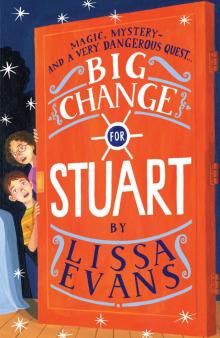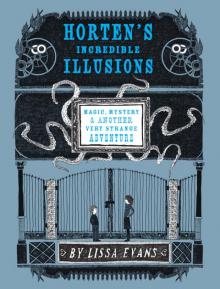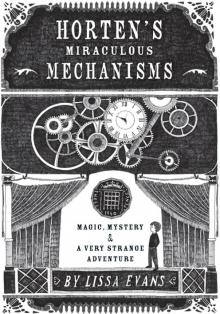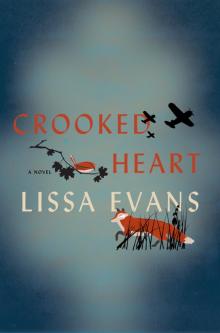- Home
- Lissa Evans
V for Victory Page 18
V for Victory Read online
Page 18
‘On the mend, now. No, I was visiting relatives in the North Country.’
‘Your father?’ asked Noel, remembering the purported resemblance between himself and his paternal grandfather. Simeon shook his head without replying. He had lost the bounce and lustre of their first encounter.
‘Not a lot to look at, is there?’ he said, glancing around the entrance hall, empty apart from a heavily sand-bagged statue of St Paul. ‘Tell you what, I could do with a cup of coffee.’
‘There’s only the service canteen in the basement,’ said Noel. ‘I’m afraid that they wouldn’t let me in.’
‘Pity. Would you wait while I went in there? I wouldn’t be long.’ To avoid breaking a note, he borrowed a half-crown from Noel and disappeared through the swing doors. There was nowhere to sit in the corridor outside. Noel leaned against the wall, and watched the curators come and go through the staff-room door. One or two nodded to him – he was, he supposed, a familiar sight by now and, moreover, he’d asked several of them over the course of the week about the carved roof boss he’d seen in the ruined church, which had supposedly been sent to the museum. No one had known anything about it.
‘Still here?’ asked his father, wiping his mouth with a handkerchief as he re-emerged. ‘Where shall we go now?’
‘Would you like to see the Cast Court?’
‘Not particularly.’
‘The armoury corridor? They have a display of Tudor sabatons – it’s extraordinary to see how small men’s feet were in the sixteenth century.’
‘Is it? Sorry, it’s just … when I was fifteen, you couldn’t have got me near a museum – I’d rather have done almost anything else. Still, we can’t all be the same, can we? Lead on, Macduff.’
The heartiness of the last two sentences was belied by a toneless delivery, as if they were being read by a bored actor, and the thought came to Noel (like an ice-cube dropped down the back of his neck), that perhaps his father had only come to the museum because he’d had nothing else to do that morning, rather than out of any desire to meet him again. Perhaps that first encounter on Christmas Day had been enough for him, a simple assuagement of curiosity; or perhaps he’d been disappointed – had been hoping for a different sort of boy: rowdy, vivid, sporting; maybe that’s what a father required: a replica.
‘What did you do, then?’ asked Noel. ‘At my age?’
‘I suppose, when I wasn’t at school, I rampaged around with pals. Or hung about near the girls’-school entrance.’
‘I have a girlfriend,’ said Noel, with attempted casualness.
‘Glad to hear it. Is she pretty?’
‘Do you know the da Vinci portrait of the The Lady with the Ermine?’
‘You mean she’s on the po-faced side? Like Mona?’
‘No. I mean …’ Noel weighed the public embarrassment of uttering the words ‘gamine yet possessed of soulful depths’ and then realized that Sim wasn’t listening anyway, or even looking towards him, and that his face in repose looked not only ill, but glumly exhausted, the expression of someone in a hopeless fix, a man trapped in a muddy hole.
‘We could do something else,’ said Noel. ‘We could go to …’ He groped for a destination that his father might find entertaining, but the night without sleep had sanded his thoughts down to nubbins and all he could think of was the seaside, Vee gallivanting along the prom while he sat in the dark, tearing at his fingernails. ‘The Serpentine,’ he said. ‘We could take a boat out, if it’s not still frozen.’
‘Somewhat of a busman’s holiday for me,’ said Simeon, rousing himself. ‘Besides, I’ll have to head off pretty soon, old chap.’
‘But you’ve only just arrived.’
‘Duty calls. In any case, shouldn’t you be in school?’
‘I’m playing truant.’
‘Wagging off, we used to call it. You’ll catch it from your aunt.’
‘No, I won’t.’ The morning’s fury rose again, gusting around his skull – as if Vee would have any right to lecture him about anything. ‘She’s not even my aunt, anyway,’ he muttered, and Sim, who had begun to move away towards the stairs, looked back at him, curiously.
‘Isn’t she?’ he asked. ‘How come?’
Noel felt his face grow cold. ‘No. That isn’t … I didn’t mean that. Of course she is.’ A box of secrets, locked for four years, and idly, carelessly, he’d let it fall; even without opening the lid, he could hear the pieces rattling. ‘It was just an erroneous interjection,’ he said, panicking. ‘A semantic error. Axiomatic of fatigue.’
‘However tired I was, I don’t think I’d say my aunt wasn’t my aunt,’ said Sim, and for the first time that morning, his attention seemed fully fixed on Noel. ‘So if she’s not actually your aunt—’
The canteen doors swung open and a group of Highlanders walked out in a miasma of sweat and bacon. His father waited until they’d gone past.
‘—so if she’s not actually your aunt, then who is she? What’s her name again?’
And because Noel had momentarily been back in the world of dodge-and-run, he hesitated for just a tiny instant, to stop his lips from pursing to form the word ‘Vee’.
‘Margery Overs,’ he said, slightly too loudly.
There was a pause.
‘Are you absolutely sure?’ asked his father, and although he was smiling, Noel could almost hear the clink of handcuffs because the smile was a little too interested, and his own hesitation had felt as much a confession as a signed statement and a mug-shot. No longer trusting himself, he nipped his tongue between his teeth, and nodded, just as a cheer came from the canteen. Chairs scraped, there was a scramble of footsteps, and the corridor was suddenly filled with jubilant Poles.
‘Varsaw liberated!’ said an airman in answer to Sim’s question, and Noel said ‘Gratulacje. To jest dobre,’ and was immediately kissed on both cheeks by a succession of officers, one of whom gave him an unopened bar of chocolate and two packets of cigarettes.
‘Good God,’ said Sim, as the Poles disappeared up the stairs. ‘I can see you’re a useful chap to know. So, shall we go to the Serpentine?’
‘But I thought you had to leave.’
‘Well, perhaps I could stay for a little longer. After all, I’ve missed fourteen years of being your father.’
‘Fifteen.’
‘Fifteen, sorry. Now tell me, this … this “aunt” of yours, does she take care of you properly?’
‘Yes.’ Involuntarily, Noel raised a hand to his handknitted scarf, the colour of verdigris. ‘Yes, she does. And I’m afraid I really do have to go. You’re right about playing truant. I mustn’t. She’ll be angry.’ Even to his own ears, the excuses sounded false, the short sentences like a series of coded telegrams which, given more time, his father couldn’t fail to decipher. And Noel knew, now, that he couldn’t have both Simeon and Vee, and that the choice between them really wasn’t a choice at all.
‘Take these,’ he added, thrusting the chocolate and cigarettes at Sim, and then he turned and ran – actually ran – because he couldn’t stand the prospect of hearing Sim calling after him, as Vee had done that morning. Or, even worse, perhaps, not calling after him.
Outside, the brief thaw was over, the sky cloudless but the air like a clamp, the water in the gutters already beginning to freeze. Noel ducked into a café to buy a cup of cocoa and then came straight out again, having realized that his father had forgotten to give him the change from the half-crown, so that all he had left was twopence for the Tube. He took the District Line to Embankment and then fell asleep in the relative warmth of the Northern Line, waking with a start to find the train drawing into Highgate, which meant that not only was he on the wrong branch, but that a day which had begun with an imaginary visit to Vee’s grave had now deposited him just half a mile from the cemetery in question. It seemed almost an invitation, and one that slotted perfectly into his current mood; it was a while since he had been there.
A party of mourners was straggling up the main pa
th and Noel stood aside to let them pass; they were an oddly disparate bunch, headed by an elderly lady with the profile of a Sitwell, and a vicar still wearing his surplice and carrying the Book of Common Prayer. Next came a knot of solidly upper-crust Wimbourne-types, discussing someone called ‘old Eggy’, followed by a silent group of working men, black armbands on their jackets, and then a middle-aged woman, arm in arm with a tiny, ancient father, both of them speaking Greek.
A few yards behind the others, a plump young woman in a grey coat and beret had stopped to read a tombstone. She looked up as Noel approached, and said, ‘Oh, I know you, don’t I?’ and offered a mittened hand. ‘Winnie Crowther – we met by the ruined church. I’m the warden who wrote you a letter.’
Wonderingly, he shook it. ‘Noel Bostock. You knew Mattie.’ And the trajectory of the day, which had started low, and had sunk even further, seemed to rise a little.
She was looking comically shocked. ‘Mattie?’ I wouldn’t have dared to call her that. She was always Miss Simpkin to us.’
‘She was my godmother. I was actually just about to visit her grave.’
‘Oh, may I come?’
Involuntarily, Noel glanced back up the hill at the other mourners.
‘No, I’m not strictly with them,’ said Winnie. ‘The grave-diggers took advantage of the thaw – one big hole, I’m afraid. I was here to pay my respects to an old chap who died in my sector.’
‘From a V-2?’
‘From the cold, as a matter of fact.’ There was a pause. ‘If you’d rather visit the grave on your own, then of course I won’t intrude.’
‘No,’ said Noel, quickly. ‘I’d very much like you to. I don’t know anyone else who actually knew Mattie,’ and he set off at an assured pace, taking a side-shoot off the main path that passed between ranks of tilting Victorian headstones and pausing beside George Eliot’s grave, on which someone had placed a mouldering copy of Middlemarch.
‘Have you read it?’ asked Winnie.
‘Yes. On the whole, I preferred Silas Marner.’
‘I acted in a production of that, once.’
‘Playing Effie?’
‘Not a chance. My character was called “Woman with Firewood”.’
Noel laughed, for the first time in what felt to him like a couple of decades, and Winnie thought what a nice, odd boy he was, with a face that would never be handsome but which was nonetheless appealing; watchful, yet droll. ‘So you must have visited Green Shutters when Miss Simpkin lived there?’
‘I lived there with her,’ said Noel. ‘From the age of four. Here it is.’ He stopped by one of the newer graves, hard by the fence that separated the cemetery from Waterlow Park and overhung by elms, their brushwood bursting between the chestnut stakes. Winnie started to say something, and then exclaimed, and crouched beside the headstone to examine it more closely. Carved into the drab granite was the inscription:
MATILDA SIMPKIN
Spinster of this Parish
October 21st 1870 – December 7th 1939
A virtuous woman is above rubies
But stencilled in black paint underneath, in very large letters, were the words:
FAITH AND DARING
‘DR’ had been added in the same lettering in front of Mattie’s name.
‘Did you do that?’ asked Winnie.
‘No. It’s been there for as long as I can remember, and it’s renewed every now and again. I always imagine that it must be one of Mattie’s old comrades, sneaking in at night.’
‘I think that’s wonderful. Where does the quote come from? I don’t mean “above rubies” – the other one.’
‘It’s from the last verse of “March of the Women”. “Life, strife, these two are one, Naught can ye win but by faith and daring.”’
‘I remember it!’ said Winnie. ‘We used to sing it in the Amazons – there was a line about laughing, wasn’t there?’
‘“Firm in reliance,”’ recited Noel, with measured rhythm, ‘“laugh a defiance, laugh in hope, for sure is the end—”’
Winnie’s firm contralto picked up the song, joined for the last few words by Noel’s more tentative baritone. ‘“March, march, many as one. Shoulder to shoulder and friend to friend!” Oh my goodness,’ said Winnie, grinning. ‘I can almost smell the woodsmoke. Those campfires! We were such a motley bunch …’
Noel bent to pull away some dead couch-grass from around the headstone.
‘Do you remember someone called Ida Pearse?’ he asked, over his shoulder.
‘Yes. Yes, she was one of the older girls – a sort of leader. All of us little ones thought she was marvellous – like an ideal big sister. Do you know her, then?’
He looked back towards his task. ‘I know of her,’ he said.
‘I liked her especially because she was very good at quietly snubbing my twin sister when she got above herself. In fact, I remember early on that Miss Simpkin – Dr Simpkin – had to tell people off for being snobbish about the fact Ida was her char, but after a while no one cared in the slightest about what Ida did for a job, because it was obvious she was capable of anything.’
Noel walked a few steps away and sat on the flat plinth of the Rockwell family tomb. The cold shot straight through the seat of his trousers, and he stood up again.
‘She was Mattie’s char? Working in Green Shutters?’
‘Yes. What’s she doing now? Do you know?’
‘She’s a nurse – a hospital sister, in Gibraltar.’ But he spoke distractedly, because the past had just been pulled apart and rearranged, so that his mother and Mattie and Vee were no longer separate links in a chain, but overlapping, and his godmother was talking to young Ida in the hall, while Ida stood mopping the same flagstones that Vee cursed daily (‘What I wouldn’t give for some nice, flat linoleum …’). And when he himself was standing at the kitchen sink, peeling potatoes and idly glancing out at a chaffinch in the apple tree, he was not only seeing just what Ida had seen at the same age but probably using the same potato peeler, possibly even with the same capability. He looked appraisingly at his hands – the right a little larger than the left, the nails narrow, the knuckles prominent.
‘I haven’t said something that I shouldn’t, have I?’ asked Winnie.
‘No. Not in the least.’
Though she could see from his face that a whole dish of thoughts was simmering away. ‘I could tell you some more about Ida and the Amazons if you’d like,’ she said. ‘Shall we walk a bit, though? I’m turning into an icicle.’ She let Noel lead, and he took her on an intricate circuit of the cemetery, so that her Amazon tales were interspersed with brief and fluent accounts of his favourite incumbents (‘… and he wrote “Abide With Me”, which Mattie always said had the perfect rhythm for when you were trying to crank a recalcitrant ambulance engine’).
‘You do sound like her, you know,’ said Winnie, as they re-joined the main path.
‘Do I?’ For a second, he looked startled. ‘Oh, you mean Mattie?’
‘Yes. In terms of your vocabulary, I mean – you don’t have quite her volume. My friend Elsie, the Wren I was telling you about, told me that when she has to give commands she always pretends to be Miss Simpkin. She says it gives her confidence.’
‘“Skill and confidence are an unconquered army.”’
‘Let me guess. Millicent Fawcett?’
‘I think it’s George Herbert.’
‘Do you know, I actually recited one of your godmother’s quotes when I met up with my twin before Christmas: “Say not the needle is the most proper pen for women.”’
‘Thomas Fuller,’ said Noel, back on firmer ground. ‘Is this the twin that Ida Pearse used to snub?’
‘Yes,’ said Winnie. ‘Unfortunately, it didn’t have a permanent effect.’
‘Is she a warden too?’
‘No, though she writes about them as if she were.’
‘In what?’
‘In a new novel called Tin Helmet. It’s doing terribly well, so she tells me. Rep
rinting already.’
‘Is it good? Should I read it?’
Winnie hesitated. ‘How old are you, again?’
‘Fifteen.’
‘Well, it’s a bit … I mean, it’s quite … risqué…’
‘Oh, I see,’ said Noel, making a mental note to buy it at the earliest opportunity.
‘So who looks after you now?’ asked Winnie. ‘Not Miss Lee, surely?’
‘Miss Lee?’
‘Your godmother’s companion.’
‘Oh … no.’ There was a photograph of Florrie Lee on the wall of the drawing room, neat and alert behind a well-organized desk. ‘No, she died before I ever lived there. My aunt takes care of me.’ And how many times, he wondered, had he used the word ‘aunt’ over the last few hours? Aunt. It had almost ceased to make sense as a syllable. Aunt, aunt, aunt. Was it even a word? ‘I call her Mar,’ he said, and found himself yawning, hugely. ‘Sorry. I had a sleepless night. I ought to go home, really.’
‘Did you hear the Kilburn rocket?’
‘I heard a crump at around five o’clock. How much longer do you think they’ll go on for – do you have inside information?’
She shook her head. ‘Nobody seems to know. I’ve been told that the Germans keep shifting the launch sites as the Allies advance.’ She noticed a speck on her sleeve, and brushed it off. It was immediately replaced by another. ‘Oh, damn,’ she said. ‘Snowing again.’
They both looked back over the sloping ranks of crosses, already partially obscured, as if by a fine net curtain, and Noel thought about the last lines of Joyce’s The Dead, which Mr Reddish had recently recited over supper in what he claimed was a Dublin accent, and Winnie thought about Emlyn. There had been no further news, no letters, nothing to grasp on to except occasional, dreadful weather reports from northern Germany. Strange to think that one might hope for the chance of reading a list of speculative paint colours for a non-existent dining room.
‘I should cut along now, too,’ she said. ‘Thank you for my tour.’

 V for Victory
V for Victory Old Baggage
Old Baggage Wed Wabbit
Wed Wabbit Big Change for Stuart
Big Change for Stuart Spencer's List
Spencer's List Horten's Incredible Illusions
Horten's Incredible Illusions Horten's Miraculous Mechanisms
Horten's Miraculous Mechanisms Their Finest Hour and a Half
Their Finest Hour and a Half Crooked Heart
Crooked Heart